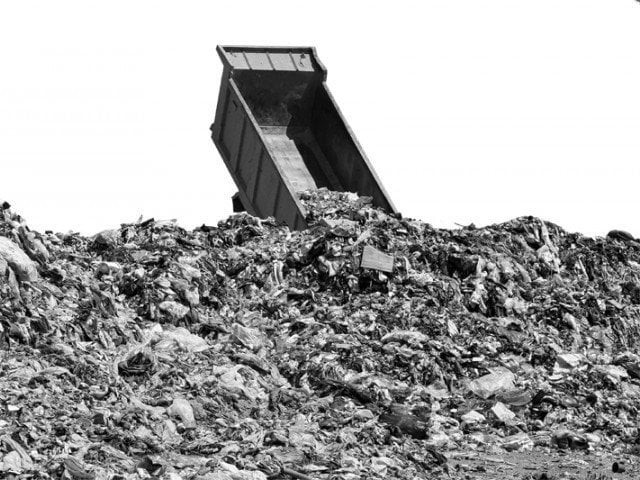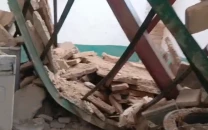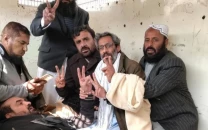Recycling facility absent from administration’s agenda
Informal waste and scrap network thrives across province

In any administration genuinely committed to environmental conservation, waste disposal should be a top priority. However, in Khyber Pakhtunkhwa (K-P), the absence of a recycling facility from the government’s agenda has allowed a thriving informal waste collection network to operate across the province.
According to the Water and Sanitation Company in Peshawar (WSSP), 700 to 900 tons of waste is collected daily from five zones of the city, totaling approximately 27,000 tons each month. Annually, the provincial capital alone generates 324,000 tons of waste, with a staggering 70 per cent left unrecycled due to the absence of proper recycling facilities.
Details gathered by the Express Tribune reveal that a significant portion of waste in Peshawar is sorted by informal waste pickers—individuals who scour the streets for plastic bottles, glass, and other items. “Informal waste pickers collect 309 tons of waste, including plastic, glass, metal, unusable items, and debris, from across the city,” confirmed Hassan Ali, a spokesperson for the main waste management authority. Details provided by the authority show the majority of its workforce is primarily engaged in sanitation services, leaving the detailed task of waste collection to informal and independent workers.
Shah Dhand, a native of Peshawar, is among the many informal waste collectors who hunt for plastic bottles, tools, and tin cans. He told The Express Tribune that he manages to resell plastic bottles for one rupee each, collecting hundreds of bottles daily.
The absence of an effective waste management system in the city has led to the emergence of a thriving network of private scrap collectors. Momin Khan, a local scrap dealer with three decades of experience, revealed that approximately 200 shops in Peshawar are associated with the scrap business. “Thousands of plastic bottles are sold to private companies every month for recycling,” he revealed. While the WSSP claims to have implemented waste collection shifts throughout the day, independent environmental experts confirmed the lack of a proper garbage collection mechanism in most districts, including Peshawar.
Just outside the provincial capital, a dumping site is operational in the Shamsatu area, but it only serves the city of Peshawar. Residents from the outskirts of the provincial capital have raised concerns about the lack of waste collection services, with many reporting heaps of garbage lining the streets for weeks and months.
“Our streets are paved with diapers, and plastic shopping bags. They not only clog drains, but also increase environmental pollution. With no other option, villagers resort to burning the garbage themselves,” claimed Amjad Khan, a resident of Jhagra, located 15 kilometers away from the provincial capital.
When asked about the thriving private network of waste collectors and resellers, the WSSB spokesperson said: “In the absence of a recycling facility, people are collecting and reselling waste items such as bottles to make money.”
Lack of waste collection
Hamid Afridi, a specialist in green growth and climate change, told The Express Tribune that informal waste collection is a new challenge contributing to plastic pollution. “Plastic waste, especially plastic bags and other single-use items, are one of the biggest components in Peshawar’s garbage dumps. Plastic waste can take up to 1,000 years to decompose in landfills,” he explained.
In the absence of a recycling facility, Afridi pointed out that residents end up burning waste. He Highlighting the health risks associated with burning plastic waste, a common practice in Peshawar, he said: “The burning of plastic waste generates pollutants like microplastics, bisphenols, and phthalates—toxins that disrupt neurodevelopment, endocrine, and reproductive functions, and contribute to carcinogenic air pollution and acid rain.”
“To eliminate this persistent waste, several low and middle-income countries, including our municipal services in Peshawar, have adopted the unregulated technique of openly burning plastic waste. This method removes the physical presence of plastic but creates a larger problem: toxic air pollution,” he cautioned. Pakistan and the provincial governments, including the K-P government, he said, have banned black plastic bags, but their use continues in the city.
Published in The Express Tribune, June 3rd, 2024.



















COMMENTS
Comments are moderated and generally will be posted if they are on-topic and not abusive.
For more information, please see our Comments FAQ